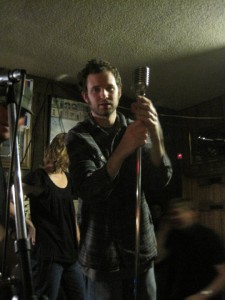From CutBank 76
Cartesian Grammar and the Lyric Form
The unspoken gap is the space that is not us. Declarative reasoning rests easy with the idea that in the major case the subject noun enacts a process that the predicate object must accept, that verbs are merely conducive material, like copper wire. But the sentence does not become a wire or a narcotic pipe stem. The declarative access to negativity cradles it. Grammar does not concern itself because it is not possible for grammar to concern itself with the incessant declaration (even within the rhetorical mode of the question) of the narrative narrating self: grammar tires beneath the epiphenomenal lyric "I." The tragic interchangeability of nouns, to borrow Ben Lerner’s phrase,has grammar, wire, and pipe stem strung through the same vacuum origin. The plastics of the writerly appliance lose sight of the topological collapsibility of their shape. Their shape is tiled throughout the floor plan of a thinking, declarative "I." The oven becomes a floor. A refrigerator is twisted and stretched hexagonally. I think of a door, as in I placed my foot in the door, and there was a door and me. The frame was solid. Breakage occurred due to the face of the door and the thought of bone. The major sentence was followed by a minor one with several knotty clauses. The second sentence was like pine, but pine of an otherworldly quality. I found that I couldn’t help but be inside; the door was swinging between two nowheres distinguished with a negative declarative syntax that is wire but is not wire when it is topology and/of pipe stem.
------------
Cal Freeman was born and raised in Detroit. He holds a BA in Literature from University of Detroit Mercy and an MFA from Bowling Green State University. His writing has appeared in many journals including Commonweal, The Journal, Nimrod, Drunken Boat, The Cortland Review, and The Paris-American. He is the recipient of the Howard P. Walsh Award for Literature, the Ariel Poetry Prize, and the Devine Poetry Fellowship (judged by Terrance Hayes). He has also been nominated for Pushcart Prizes in poetry and creative nonfiction. He currently teaches at Oakland University and lives in Dearborn, MI.

